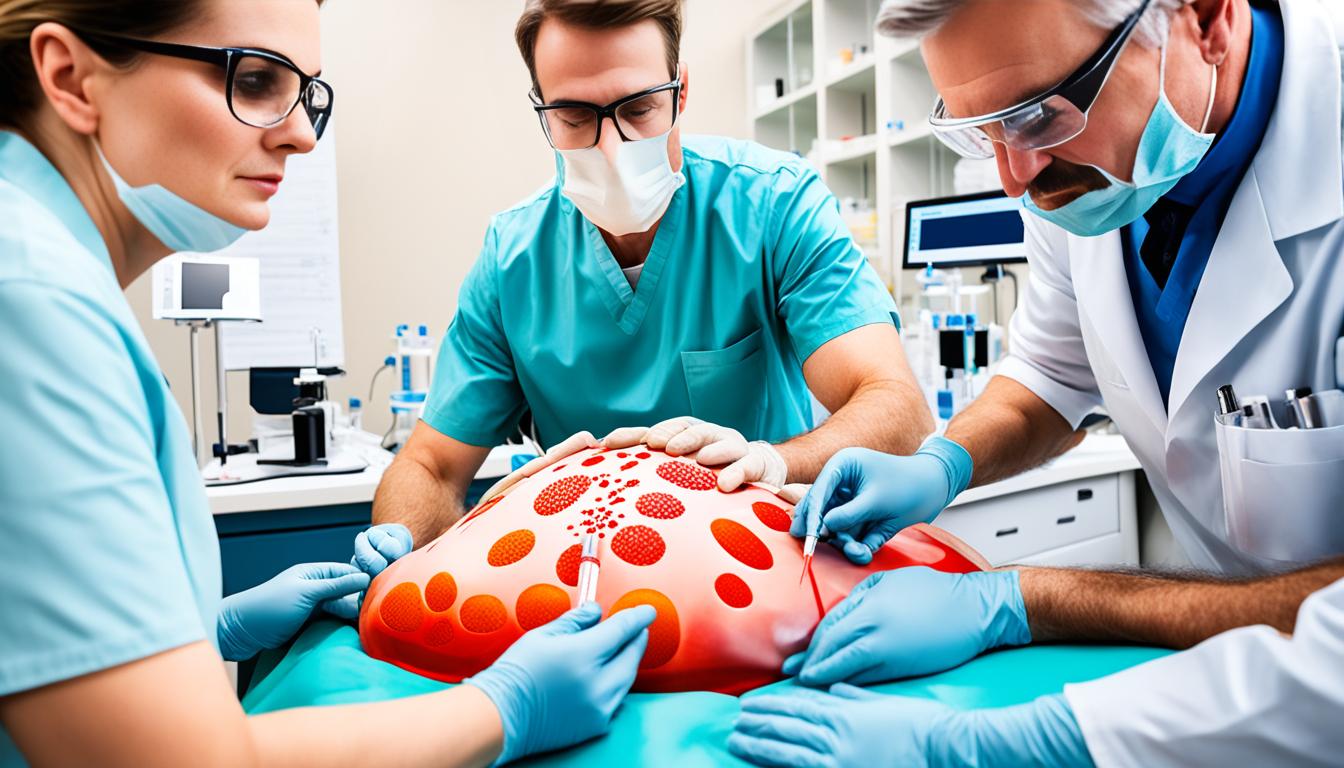Getting an allergic reaction to medication is known as drug allergy. It can cause different symptoms like rashes, itching, and swelling. Most severe cases may lead to trouble breathing and anaphylaxis, which is life-threatening. Several things, such as your body’s response to specific drug components, can trigger these reactions. Drug allergies are a big worry because they might lead to severe problems.
Diagnosing a drug allergy means looking closely at your medical history and doing a physical exam. You might also need allergy tests. In some cases, new treatments like stem cell therapy are tried. Thailand is leading in these new approaches.
Key Takeaways:
- Drug allergy is characterized by an allergic reaction to medications, resulting in a range of symptoms and potential complications.
- Allergic reactions to medications can be caused by the body’s immune response to specific chemicals in the drugs.
- Adverse drug reactions, which include drug allergies, are a significant concern due to their potential for serious complications.
- The diagnosis of drug allergy involves a comprehensive evaluation of an individual’s medical history, physical examination, and potentially allergy testing.
- Stem cell therapy is an innovative treatment being explored for medication hypersensitivity, with Thailand at the forefront of these groundbreaking therapies.
Understanding the Pathogenesis and Prevalence of Allergic Diseases
Allergic diseases like AR, AAS, AD, FA, and eczema stem from an overactive immune system. This happens due to both genes and things we’re exposed to. The disease can come from your family, but pollen, dust mites, and certain foods can also make it worse.
The world faces more allergic diseases than ever. AR, AAS, AD, and FA affect many people. We must study each to see their true impact.
Allergic Rhinitis (AR)
- Allergic rhinitis inflames the nose and sinuses.
- It causes sneezing, stuffy or runny nose, and itchiness.
- Pollen, dust mites, and pet hair often start it.
Allergic Asthma (AAS)
- Allergic asthma makes the airways sensitive and inflamed.
- Symptoms involve wheezing, coughing, and difficulty breathing.
- Irritants, allergens, exercise, and sickness can start an asthma attack.
Atopic Dermatitis (AD)
- AD, or eczema, is a chronic skin problem causing itch, redness, and rash.
- It usually starts in childhood and can last into adult life.
- Things like allergens or irritants make it worse.
Food Allergy (FA)
- Food allergy makes the body react to certain food proteins.
- Reactions vary but can include hives, swelling, and serious conditions like anaphylaxis.
- Peanuts, tree nuts, shellfish, eggs, milk, and soy are common triggers.
To manage and treat allergic diseases, we must understand their source. By recognizing the genetic and environmental aspects, doctors can make personalized treatments and preventions.
Table: Prevalence of Allergic Diseases Worldwide
| Allergic Disease | Prevalence |
|---|---|
| Allergic Rhinitis (AR) | Approximately 10-30% of the global population |
| Allergic Asthma (AAS) | Afflicts around 300 million people worldwide |
| Atopic Dermatitis (AD) | Estimated prevalence of 10-20% in children and 1-3% in adults |
| Food Allergy (FA) | Affects 2-10% of children and 1-2% of adults globally |
Innovative Stem Cell Therapy for Medication Hypersensitivity in Thailand
Thailand is now leading the way in stem cell therapy. It brings hope to those with medication hypersensitivity issues. This advanced therapy helps the body better handle medications and lessens allergic reactions by adjusting the immune response.
This therapy can be tailored to each person. It uses the patient’s own stem cells or those from a donor to heal. People from all over travel to Thailand for its groundbreaking treatments in pharmaceutical allergies.
In Thailand, stem cell therapy is at the forefront of innovative treatments. The country commits to ongoing research and development in this area. This therapy gives new hope to those dealing with drug allergies, bringing in a new chapter of treatments not only for Thailand but also for many others around the world.
FAQ
Q: What is drug allergy?
A: Drug allergy happens when your body reacts badly to medicines. You might get rashes, itch, swell, or find it hard to breathe. In worst cases, it can lead to anaphylaxis which is life-threatening.
Q: What causes allergic reactions to medications?
A: The body’s immune system can overreact to certain drug chemicals. This overreaction leads to allergic symptoms.
Q: How are drug allergies diagnosed?
A: Doctors diagnose drug allergies by looking into your medical history. They might also do a physical exam and run some allergy tests.
Q: What are adverse drug reactions?
A: Adverse drug reactions include drug allergies. They are very serious and can cause major problems.
Q: Can stem cell therapy treat medication hypersensitivity?
A: Yes, researchers believe stem cell therapy could help with medication allergies. It works by changing the immune response and fixing any damaged tissues.
Q: Where can I find advanced stem cell therapy for pharmaceutical allergies?
A: Thailand is leading in advanced stem cell therapy for medicine allergies. People from all over go to Thailand for these treatments.

